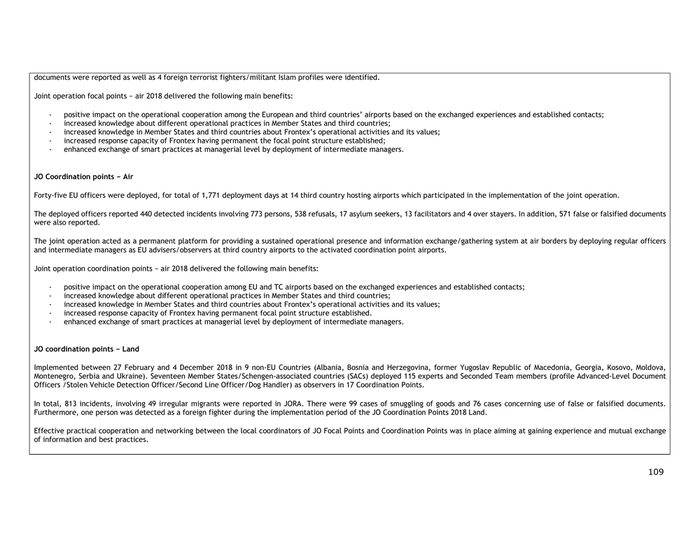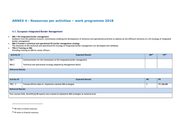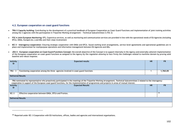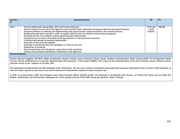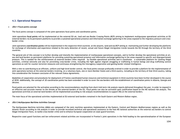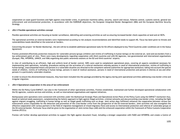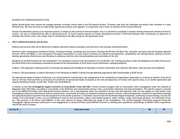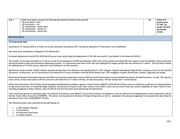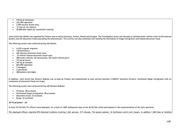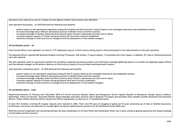Microsoft Word - CAAR_2018_FINAL_Adopted_Reg. No. 5865_13.06.19
This page is intentionally left blank. 100

ANNEX 4 - Resources per activities – work programme 2018 4.1. European Integrated Border Management IBM-1 EU integrated border management Guidance from the political (Council, Commission) enabling the development of technical and operational priorities to address by the different elements of a EU strategy of integrated border management IBM-2 Frontex’s technical and operational EU border management strategy The elements of the technical and operational EU strategy of integrated border management are developed and validated. TRU-2 Training on IBM Providing training on IBM for senior officers. Activity ID Expected Results HR24 FR25 IBM-1 Communication for the Commission on EU-integrated border management IBM-2 Technical and operational strategy adopted by Management Board Delivered Results Activity ID Expected Results HR FR TRU - 3 Trained officers able to implement national IBM strategies 1 77,160.80 Delivered Results Four courses held, benefitting 98 experts now trained to implement IBM strategies at national level. 24 HR refers to human resources. 25 FR refers to financial resources.
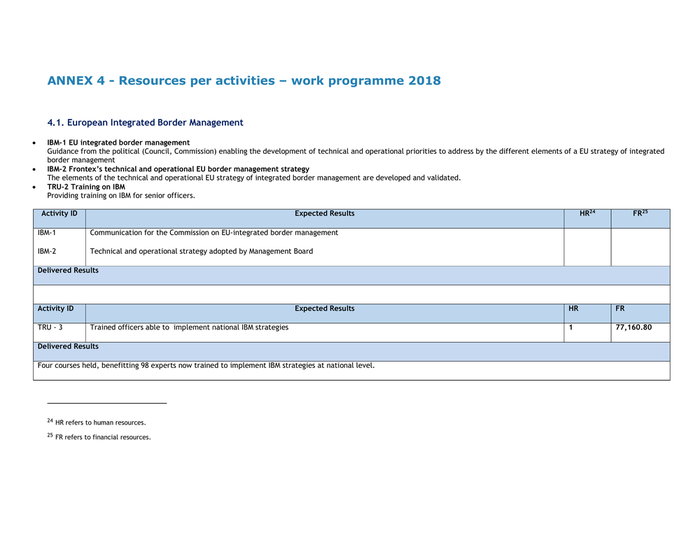
4.2. European cooperation on coast guard functions TRU-3 Capacity building: Contributing to the development of a practical handbook of European Cooperation on Coast Guard Functions and implementation of joint training activities among the 3 agencies with the participation in Tripartite Working Arrangement − Technical Subcommittee 2 (TSC 2) FSC-4 Joint European Monitoring: EFS, Copernicus services, as well as monitoring and communication services are provided in line with the operational needs of EU Agencies (including EFCA, EMSA, Europol etc.) and MSs and their close involvement IEC-3 - Interagency-cooperation: Ensuring strategic cooperation with EMSA and EFCA. Sound working level arrangements, service level agreements and operational guidelines are in place and implemented for multipurpose operations and information management between EU Agencies and MSs. JOU-2 - European cooperation on Coast Guard Functions Concept: the overall objective of the Concept is to support internally in the Agency and externally coherent implementation of the European cooperation on coast guard functions as assigned to the Agency by the regulation allowing to face firmly the challenges related to maritime domain by proving solid baseline and robust response. Activity Expected results HR FR ID TRU - 3 Functioning cooperation among the three agencies involved in coast guard functions 1 1,765.05 Delivered Results TRU nominated its representative who proactively participated in the meetings of the Tripartite Working Arrangement, Technical Subcommittee 2 related to the interagency cooperation in support of the European coast guard functions, for the implementation of programmes and projects in areas of mutual interest. Activity Expected Results HR FR ID 26 IEC-3 Effective cooperation between EMSA, EFCA and Frontex. Delivered Results 26 Reported under IEC−3 Cooperation with EU Institutions, offices, bodies and agencies and international organisations. 102
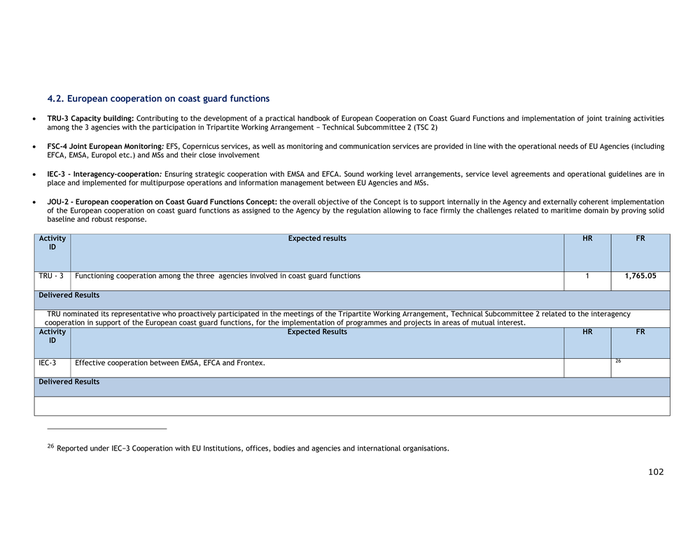
Activity Expected Results HR FR ID JOU-2 - Overall collaboration among EMSA, EFCA and Frontex enhanced. 4 FTE and 346,000 - Areas of interest for services of the Agencies to be provided to MS’ authorities carrying out defined coast guard functions. 3 STM - European platform for debating and implementing coast guard function-related activities in the maritime domain. (ECGFO) - Multipurpose operations concept in order to support coherent and cost-efficient action tested and applied. - Exchange and use of surveillance systems-generated data implemented. - Testing and use of various information exchange platforms in real operational scenarios. - Trainings and briefings successfully implemented. - Promotion of best practices applied. - Exchange of operational data and intelligence in close to real time. - Elaboration of standards. - Shared experiences and interagency cooperation further promoted. - Internal cross-divisional coordination maintained on the high level. Delivered Results Frontex took part together with EFCA, EMSA and Denmark, Estonia, Finland, Latvia, Lithuania, Poland, Russia, Sweden in the Operation ‘Baltic Tracking 2018’ (17−30 September 2018). The aim was the establishment of a common ‘Maritime Multi-risk Awareness’ in the frame of BSRBCC with a focus on the implementation of the CGFs as border control, fisheries control, pollution control at sea, response to oil spills, SAR. CGS organised and implemented two SAR workshops within JO Poseidon. The aim was to enhance coordination and cooperation among all operational actors involved in SAR operations, as well as to boost capacity to save lives at sea and to improve the humanitarian response to those rescued at sea. In 2018, as a pilot project, STMs with European Coast Guard Functions Officer (ECGFO) profile were deployed in JO Poseidon (ICC Piraeus), JO Themis (ICC Rome) and JO Indalo (ICC Madrid). Additionally, one STM has been redeployed for a short period on board of EFCA OPV during the operation ‘Baltic Tracking’. 103
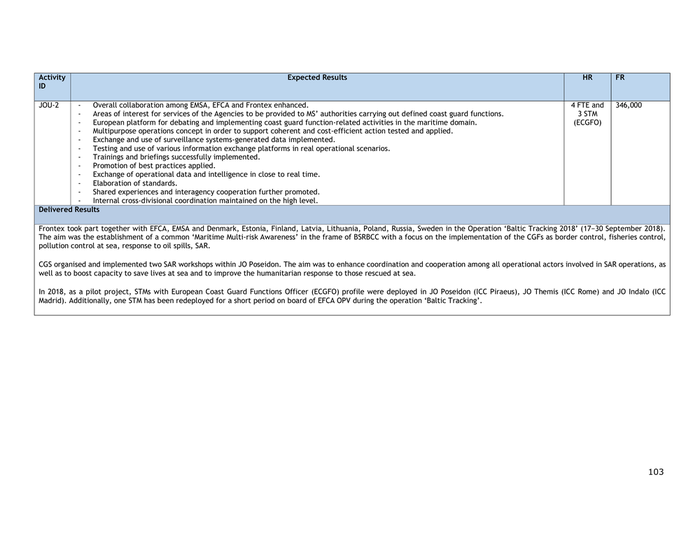
4.3. Operational Response JOU-1 Focal points concept The focal points concept is composed of the joint operations focal points and coordination points. Joint operations focal points will be implemented at the external EU air, land and sea Border Crossing Points (BCP) aiming to implement multipurpose operational activities at EU external borders via its permanent platforms to provide a sustained operational presence and information exchange/gathering in the areas exposed to the migratory pressure and cross- border crime. Joint operations coordination points will be implemented in the respective third countries at the airports, land and sea BCP aiming at maintaining and further developing the platforms for exchange of information and experience related to the early detection of recent, actual and future illegal immigration trends towards the EU through the territory of the third countries. The general aim of this concept is to further develop and intensify the implementation of multipurpose operational concepts, and to further develop the operational activities at air, sea and land borders as permanent platforms for providing sustaining operational presence and information exchange/gathering in the areas exposed to specific and disproportionate pressure. This is needed for the reinforcement at external borders when required by flexible operational activities and it constitutes a sustainable platform for tackling illegal activities, criminal networks and also for preventing cross-border crime, including the fight against migrant smuggling or trafficking in human beings and drug trafficking control operations as well for counter-terrorism measures and continuous strengthening the interagency cooperation and gaining border related intelligence. With a view to contributing to an efficient, uniform and high-level border control, the focal points concept profoundly evolved in order to provide a platform for the implementation of joint operations/actions at the external borders involving, on a voluntary basis, one or more Member States and a third country, including on the territory of that third country, taking into consideration the foreseen conclusion of the relevant Status Agreements. Modalities of cooperation and procedures for deployment of Frontex coordinated human resources and technical equipment in third countries have been further developed in the course of 2018. Additionally, the concept of JO coordination points has been extended in order to cover the sea borders with the establishment of coordination points in Albania, Georgia and Ukraine. Focal points are selected for the activation according to the recommendations resulting from short/mid-term risk analysis reports delivered throughout the year, in order to respond in an effective and accurate manner to the threats at the external borders of the EU. Focal points can also be activated upon justification based on the MS national risk analysis. The operational activities at external land borders will be implemented according to risk analysis recommendations to support MSs at the external borders. The main focus of the operational activities implemented at EU external land borders remained in the South Eastern and Western Balkan region. JOU-2 Multipurpose Maritime Activities Concept The Multipurpose Maritime Activities (MMA) are composed of the joint maritime operations implemented at the Eastern, Central and Western Mediterranean regions as well as the Atlantic Ocean according to risk analysis in order to provide increased technical and operational assistance to the host MS national authorities at the external sea borders to control illegal immigration flows, to tackle cross-border crime and to enhance European cooperation on coast guard functions. Respective coast guard functions and law enforcement related activities are incorporated in Frontex’s joint operations in the field leading to the operationalisation of the European 104
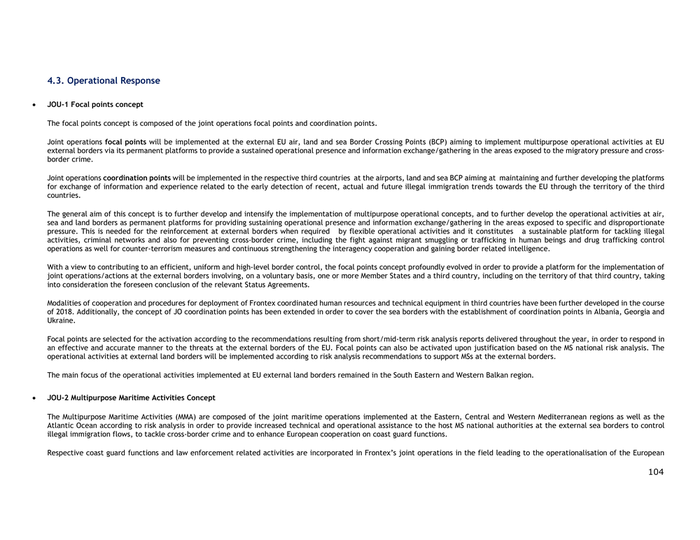
cooperation on coast guard functions and fight against cross-border crime, in particular maritime safety, security, search and rescue, fisheries control, customs control, general law enforcement and environmental protection, in accordance with the EUROSUR objectives, the European Integrated Border Management (IBM) and the European Maritime Security Strategy. JOU-3 Flexible operational activities concept Flexible operational activities are focusing on border surveillance, debriefing and screening activities as well as ensuring increased border check capacities at land and air BCPs. The operational activities at external borders were implemented according to risk analysis recommendations and identified needs to support MS. Focus has been given to threats and vulnerabilities/needs identified at the external air borders. Concerning the project ‘Air Border Monitoring’, the aim will be to establish additional operational tasks for EU officers deployed to key Third Countries under conditions set in the Status Agreement. Frontex promoted effectively protection measures for vulnerable persons/groups (children and victims of trafficking in human beings) at the external air, land and sea borders from a law enforcement point of view. There were many developments regarding cooperation with third countries and with EU Agencies, non-governmental and international organisations (Europol, FRA, INTERPOL, UNHCR, and IOM) organising also public awareness sessions at the EU and third countries’ airports. In view of contributing to an efficient, high and uniform level of border control, SOPs were used to complement operational plans, covering all aspects considered necessary for implementing joint operations, including: procedures setting out the activation of a referral mechanism whereby persons in need of international protection, victims of trafficking in human beings, unaccompanied minors and persons in a vulnerable situation are directed to the competent national authorities for appropriate assistance; taking into account the special needs of children, victims of trafficking in human beings, persons in need of medical assistance, persons in need of international protection and persons in distress at sea and other persons in a particularly vulnerable situation. In order to ensure the aforementioned measures, they have been included into the package provided by the Agency during joint operational activities addressing cross border crime and irregular migration. JOU-4 Operational cooperation in the area of law enforcement Within the EU Policy Cycle/EMPACT, but also in the framework of other operational activities, Frontex established, maintained and further developed operational collaboration with the EU agencies, customs services and entities, as well as international organisations and regional initiatives. Multipurpose joint operations were connected with activities under the Multiannual Strategic Plans and Operational Action Plans of the Policy Cycle using the EMPACT mechanism thus, based on tailored needs assessment, complementing the holistic approach to fight against illegal activities, criminal networks and also preventing cross border crime, including the fight against migrant smuggling, trafficking in human beings as well as illegal goods trafficking such as drugs. Joint action days fulfilment enhances the cooperation between various law enforcement actors responsible for the detection and prevention of the cross-border crime from the perspective of the EU external borders. Joint activities will also strengthen the effective cooperation with various partners in the field of migration management of mixed migratory flows and access to international protection and referral of vulnerable groups at the EU external border. Particular focus shall be given to the organisation of Joint Action Days (JAD) and the enhanced cooperation within the framework of Police Customs Cooperation Centres (PCCCs). Frontex will further develop operational activities to support the fight against document fraud, including a stronger cooperation with FADO and INTERPOL and create a Centre of 105
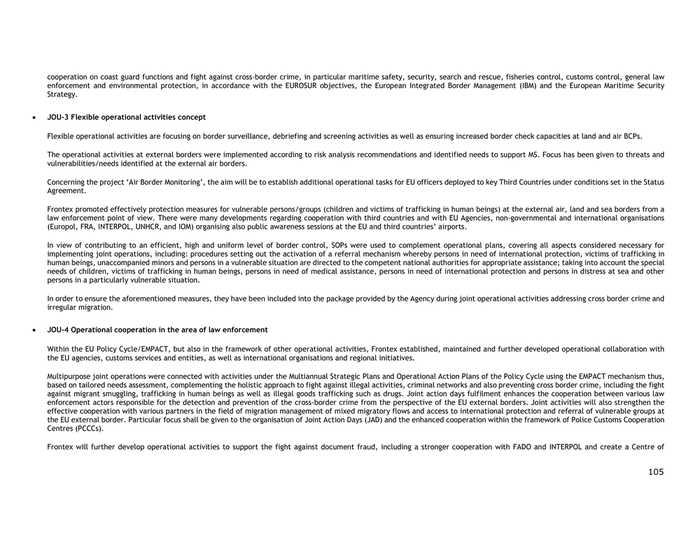
Excellence for Combating Document Fraud. Border guards/police and customs are strategic partners in border control tasks at the EU external borders. To better cope with the challenges and deliver their mandate in a more efficient way, the time has come to make border guards and customs work together in a systematic way in order to enhance the EU Internal Security. Frontex has identified customs as an important partner in relation to the control of external borders, thus it is pertinent to establish a common working framework related to Frontex’s activity, not only at institutional but also at operational level. To invite Customs experts to Frontex operational activities in 2018 and facilitate their contribution to objectives of tackling cross border crime, was a major step in contributing to the IBM concept on the operational level. JOU-5 Additional products and services Products and services that can be delivered in addition and more tailored to products and services of the concepts mentioned before. Activities under multipurpose maritime activities, including briefings, workshops and live events, involving the MS from the Black Sea, and other sea basins and the European Agencies (Frontex, EFCA and EMSA), in the framework of European cooperation on Coast Guard functions) are related to harmonisation, compatibility and interoperability seeking to further develop operational effectiveness and efficiency in coherence with the main recommendations and conclusions of the JOs. Handbook of the Best Practices for the Land Borders’ ICC procedures aimed at the harmonisation of Land Borders’ ICC working procedures while the Handbook of the Best Practices for the Focal Points Local Coordinators procedures focused on the harmonisation of Focal Points Local Coordinators working procedures. In March, CGS organised a meeting aimed at reviewing and updating the Handbook for Boarding in Frontex coordinated Joint Maritime Operations. Best practices and Guidelines In March, CGS participated, in Lübeck (Germany) in the Workshop on Mobile Training Concept Boarding organised by DEU Chairmanship of ECGF Forum. The Operational Heads of Airport Conference is an annual platform contributing to the enlargement of the coordination of operational cooperation at external air borders of the EU as well as with key third countries by increasing the awareness of operational heads of airports on the role and objectives of Frontex with specific focus on air border operational and capacity-building activities, actual risks, threats and vulnerabilities. In relation to the Pilot Investigation Support Activities on Cross-Border Crime (ISA-CBC), Frontex started to support MSs on cross-border crime investigations under the umbrella of Regulation (EU) 1624/2016, according to cross-border crime definition and requirements (serious crime, cross-border dimension and external borders). This specific support is granted out of the EMPACT/EU Policy Cycle Operational Actions platform, but is also organised under the umbrella of certain OAs and especially JADs. For the support of cross-border crime investigations led by Law Enforcement Units at national level, investments at Frontex are needed in relation to specific services, technical equipment, finances for operational meetings and operational advice/expertise from the perspective of the border protection. It therefore concerns both the facilitated illegal immigration, trafficking in human beings, but also the variety of all cross-border crimes, such as trafficking of firearms and ammunition, tobacco and alcohol products, stolen vehicles, drugs, fuel/energy products, environmental crime, etc. The presence in EU Policy Cycle/EMPACT in last years allowed to better understand the needs of the investigators. The tactical/strategic information acquired during the investigation support activities could result in new engagements in various EU Policy Cycle/EMPACT Priorities or shifting some operational undertakings to EMPACT OAPs in agreement with EU MS and/or Europol. Activity ID Expected results HR FR 106
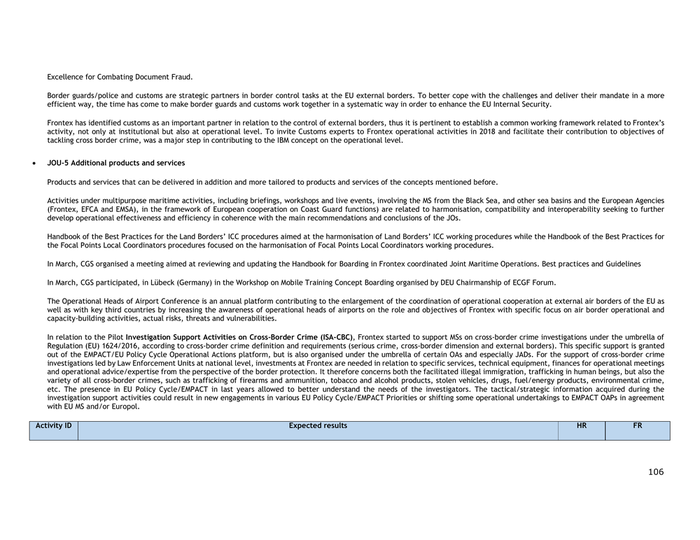
JOU-1 Under focal points concept the following operational activities were planned: 25 5,062,215 -JO focal points −land; (land border -JO focal points − air; 72.59%, air -JO coordination − points land; border 26.87%, -JO coordination − points air; sea border -JO coordination − points sea; 0.54%) Delivered results JO Focal points land Launched on 31 January 2018 as a follow-up to joint operation focal points 2017. During the operation 47 focal points were established. New focal point established in Raigardas (LTU-BLR border). Increased deployments during FIFA 2018 World Cup and Joint Action Days and deployment of TM with new profile ‘Cross-Border Crime Detection Officer’. The number of man-days amounted to 17,226 as a result of the deployment of 594 Team Members (TMs) with various profiles providing effective support to the host Member States authorities during the border checks and information gathering activities. It is noteworthy that most of the TMs were deployed for longer periods than the minimum of 1 month. JO Focal Points hosted the deployment of 19 third country observers from 6 different non-EU countries. Operational results include 19,058 incidents reported among others the detection and apprehension of 3,021 irregular migrants attempting illegal border crossing as well as 2,163 falsified documents. Furthermore, the JO contributed to the detection of various incidents involving 48 facilitators and 1,351 smugglers of goods (ammunition, alcohol, cigarettes and drugs). Enhanced exchange of information between the Police and Customs Cooperation Centres (PCCCs) and the focal points was accomplished during the JO implementation. In total, 432 inquiries were sent by various focal points to PCCCs and led to the detection of 11 stolen vehicles, 26 false documents, 18 false stamps and 1 wanted person. Within the framework of the EU Policy Cycle/European multidisciplinary platform against criminal threats (EMPACT) 2018 JO Focal Points Land was utilised as a platform for implementation of operational activities in combating illegal migration and document fraud but also other serious cross border crimes such as excise fraud and various modalities of motor vehicle crime, including smuggling of stolen vehicles, parts of vehicles and the document fraud associating the phenomena. Joint Action Day Danube III organised under the umbrella of EU policy cycle/EMPACT and co-led by Frontex and Bulgaria as well as Lithuania was implemented in close cooperation with EU Member States (MSs), Europol and INTERPOL. The action was focused on facilitation of illegal immigration as well as organised crime groups smuggling of excise goods and also linked to document fraud cross-cutting EMPACT Priority. The following results were achieved during JAD Danube III: 2,168 irregular migrants 23 facilitators 63 document fraud cases 31 stolen vehicles 107
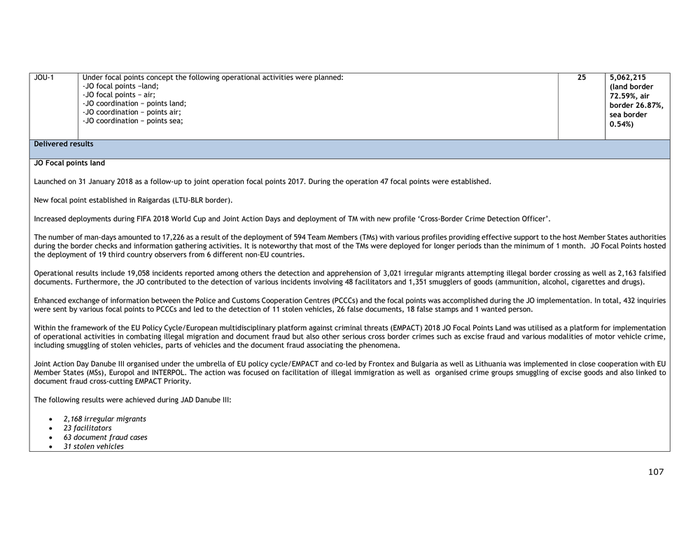
510 kg of marijuana 332,550 cigarettes 2,950 Ancient Greek coins 12 tons of raw tobacco 20,000 fake labels for counterfeit clothing Joint Action Day Mobile was organised by Frontex and co-led by Germany, Greece, Poland and Europol. The investigative action was focused on tackling motor vehicle crime via EU external borders and the document fraud associating this phenomenon. This activity was also combined with tackling the facilitation of illegal immigration and related document fraud. The following results were achieved during JAD Mobile: 4,535 irregular migrants 139 facilitators 202 identity document fraud cases 33 vehicle-related document fraud cases 500 stolen vehicles; 26 motorcycles; 324 stolen vehicle parts 712 kg of heroin 547 kg of cannabis 825,099 cigarettes 7 handguns 2 gas pistols 506 bullets/cartridges In addition, Joint Action Day Western Balkans was co-lead by Frontex and implemented as joint activity between 4 EMPACT priorities (Firearm, facilitated illegal immigration with its component of document fraud and drugs). The following results were achieved during JAD Western Balkans: Firearms: 50 arrestees Facilitated illegal immigration: 90 arrestees Document fraud: 23 arrestees Drugs: 41 arrestees JO Focal points − air In total 157 EU/SAC/TC officers were deployed, for a total of 3,887 deployment days at the 26 EU/SAC which participated in the implementation of the joint operation. The deployed officers reported 874 detected incidents involving 1,461 persons, 317 refusals, 716 asylum seekers, 16 facilitators and 6 over stayers. In addition 1,360 false or falsified 108
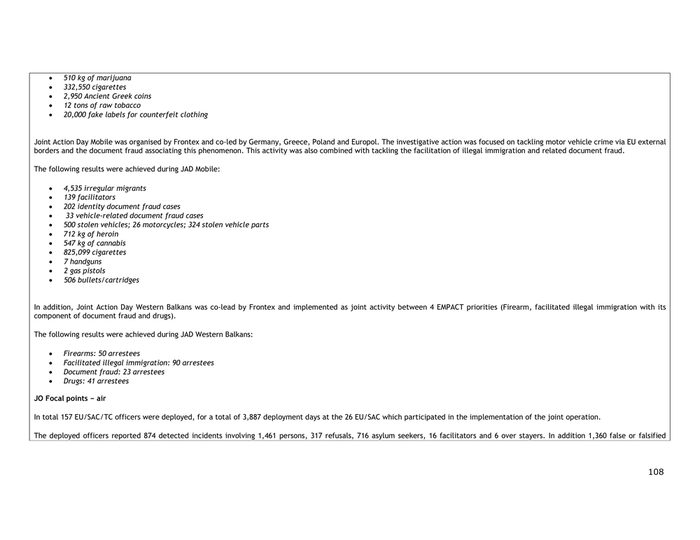
documents were reported as well as 4 foreign terrorist fighters/militant Islam profiles were identified. Joint operation focal points − air 2018 delivered the following main benefits: - positive impact on the operational cooperation among the European and third countries’ airports based on the exchanged experiences and established contacts; - increased knowledge about different operational practices in Member States and third countries; - increased knowledge in Member States and third countries about Frontex’s operational activities and its values; - increased response capacity of Frontex having permanent the focal point structure established; - enhanced exchange of smart practices at managerial level by deployment of intermediate managers. JO Coordination points − Air Forty-five EU officers were deployed, for total of 1,771 deployment days at 14 third country hosting airports which participated in the implementation of the joint operation. The deployed officers reported 440 detected incidents involving 773 persons, 538 refusals, 17 asylum seekers, 13 facilitators and 4 over stayers. In addition, 571 false or falsified documents were also reported. The joint operation acted as a permanent platform for providing a sustained operational presence and information exchange/gathering system at air borders by deploying regular officers and intermediate managers as EU advisers/observers at third country airports to the activated coordination point airports. Joint operation coordination points − air 2018 delivered the following main benefits: - positive impact on the operational cooperation among EU and TC airports based on the exchanged experiences and established contacts; - increased knowledge about different operational practices in Member States and third countries; - increased knowledge in Member States and third countries about Frontex’s operational activities and its values; - increased response capacity of Frontex having permanent focal point structure established. - enhanced exchange of smart practices at managerial level by deployment of intermediate managers. JO coordination points − Land Implemented between 27 February and 4 December 2018 in 9 non-EU Countries (Albania, Bosnia and Herzegovina, former Yugoslav Republic of Macedonia, Georgia, Kosovo, Moldova, Montenegro, Serbia and Ukraine). Seventeen Member States/Schengen-associated countries (SACs) deployed 115 experts and Seconded Team members (profile Advanced-Level Document Officers /Stolen Vehicle Detection Officer/Second Line Officer/Dog Handler) as observers in 17 Coordination Points. In total, 813 incidents, involving 49 irregular migrants were reported in JORA. There were 99 cases of smuggling of goods and 76 cases concerning use of false or falsified documents. Furthermore, one person was detected as a foreign fighter during the implementation period of the JO Coordination Points 2018 Land. Effective practical cooperation and networking between the local coordinators of JO Focal Points and Coordination Points was in place aiming at gaining experience and mutual exchange of information and best practices. 109
